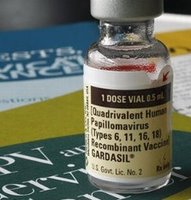One in four California adolescent girls has had HPV (cervical cancer) vaccine

San Bernadino, CA
A large number of California teens are showing up at medical clinics to receive the cervical cancer vaccine Gardasil, according to a UCLA survey released this week.
Less than two years after the HPV vaccine was approved as a routine vaccination for girls aged 11 and older, one-quarter of the state's adolescent girls have started the series of shots that protect against human papillomavirus, which is strongly linked to cervical cancer.
A majority of the state's teen girls, parents and young women also say they would like to have the vaccine, according to the new policy brief released this week by the UCLA Center for Health Policy Research.
"This is the very first data we have on the use of the vaccine and there appears to be a high acceptance," said David Grant, a sociologist and the survey director. "It's a positive start."
The brief, "One in Four California Adolescent Girls Have Had Human Papillomavirus Vaccination," is an early indicator of how a controversial vaccine is being accepted by the general public, he said.
The vaccine works by provoking the body's immune response to HPV without actually causing HPV infection or any of the diseases.
The vaccine contains inactivated extracts from four different types of the human papillomavirus. These types of HPV cause 70 percent of cervical cancers and 90 percent of genital warts.
The vaccine is administered in a series of three injections over a six-month period
Advertisement
and targets the HPV types most commonly associated with genital warts and cervical cancer.
There were concerns about the vaccine when it was licensed for use by the Food and Drug Administration in 2006, then recommended for use by the National Centers for Disease Control and Prevention in 2007.
Much of the concern has been about its safety and worries that it might encourage girls to be sexually active.
But as more information on the vaccine has been released, it has become more accepted.
According to the survey, among teen girls in California aged 13 to 17, about 378,000 out of 1,468,000 (26 percent) reported receiving at least one dose of the vaccine.
Among California females aged 18 to 26, about 262,000 out of 2,273,000 (12 percent) reported receiving at least one dose of the vaccine in 2007 and 4 percent had completed the vaccine series.
Among those surveyed who had not yet had the HPV vaccine, not knowing enough about the vaccine was the main reason cited by young adult women age 18 to 26 (31 percent) and parents of age-eligible daughters (54 percent).
Other frequently cited explanations included concerns about the vaccine's safety and questions about its necessity.
Labels: Cervical Cancer Prevention, Cervical Cancer Vaccine, Gardasil

0 Comments:
Post a Comment
<< Home